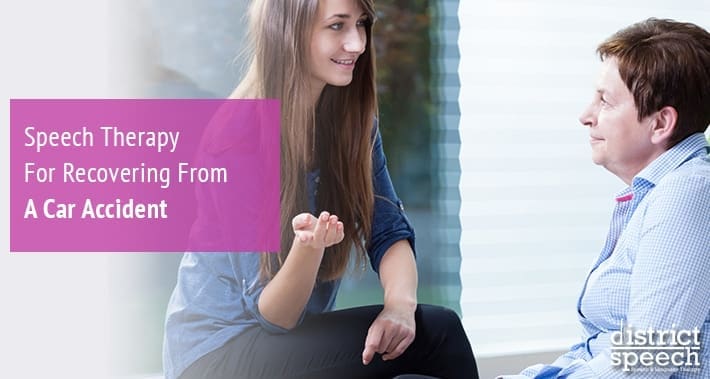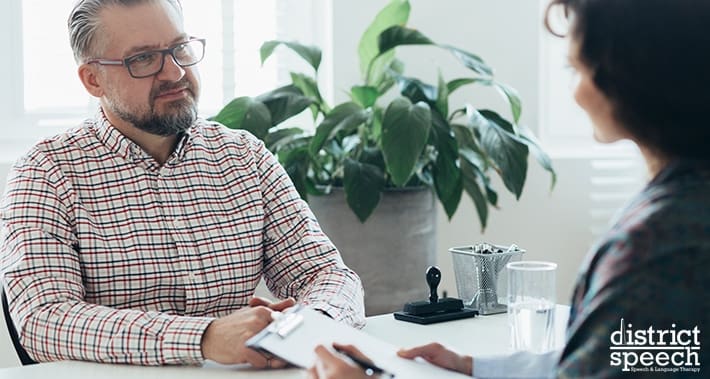
The aftermath of a car accident can be both physically and mentally devastating.
From whiplash and concussions to broken bones, fractures, and even death, the life altering consequences of car crashes can have major repercussions throughout your entire body.
When it comes to car accident injuries, you’d be forgiven if you’ve never considered the impacts these injuries can have on your speech and language skills.
Nonetheless, the development of speech disorders following a car crash is quite common.
Therefore, speech therapists play an integral role in car accident recovery.
“Why”, you ask?
Speech therapists are trained to help car crash victims recover from their accidents and life healthy, productive lives.
For instance, speech therapy can help you recover from traumatic brain injury or other speech related concerns you may experience from a car accident.
Let’s find out more.
What Speech Disorders Can Happen From A Car Accident?
Your brain is a powerful organ which is responsible for all your high cognitive functions, such as speaking and understanding conversations.
RELATED: How Does Your Brain Control Speech?
Therefore, injuries to your brain may potentially lead to a variety of speech and communication difficulties.
Your brain plays a big role in car accident injuries and recovery.
One of the most common injuries associated with car accidents are traumatic brain injuries (TBIs).
TBIs refer to a type of physical injury which impairs your brain’s ability to properly function.
Depending on the location and severity of the injury, a TBI can drastically impact your ability to speak and use language.
For example, the Wernicke’s area of your brain is responsible for your speech and language skills.
Therefore, damage to this area will very likely result in impairments to your speech production and comprehension.
Speech disorders refer to a wide variety of impairments and disabilities.
Thus, speech disorders caused by injuries sustained during car accidents can present in a variety of different ways.
Some of the most common speech disorder symptoms associated with car accidents include:
- Difficulty recognizing vocabulary previously understood
- Memory impairments
- Inability to produce fluid, rapid speech
- Difficulty completing sentences
- Misusing words
- Difficulty understanding and using puns, idioms, and turns of phrases
Dysarthria and aphasia are examples of speech disorders which commonly develop as a result of a car accident.
Next, we’ll take a closer look at each of them.
Dysarthria
Dysarthria is a type of motor speech disorder which commonly develops due to nervous system damage following a car accident.
It may also develop due to damage to your vocal muscles.
People with dysarthria typically have trouble forming and pronouncing words.
Other symptoms of dysarthria may include:
- Difficulty controlling your speech rate
- Slurring words or speaking robotically
- Difficulty moving your lips, tongue, or jaw
- Speech that sounds breathy, nasally, or hoarse
If you’ve been diagnosed with dysarthria following a car accident, you’re not alone.
At District Speech, we offer speech therapy programs for dysarthria aimed to help you recover from your injury and regain your speech and language skills.
Your speech therapist will spend time with you to put together a treatment plan that suits your unique strengths and needs.
Depending on your situation, we’ll focus on strengthening the muscles in your mouth and face, as well as improving the volume and speed of your speech.
Your speech therapist can also work with your family and friends to help practice effective speaking techniques and improving communication.

Aphasia
Aphasia is another speech disorder commonly associated with car accidents.
And like dysarthria, it can also cause significant impairments in your communication.
Aphasia often occurs following an injury that affects your brain, such as those commonly seen in car accident victims.
It’s also common in people who’ve had a stroke.
RELATED: Speech Therapy For Stroke Recovery
Because it generally results from an injury, there are a number of different ways aphasia can manifest itself.
People with aphasia often struggle with speaking, writing, reading, and understanding others.
Therefore, the symptoms of aphasia can show up in a wide range of your communication abilities, including your literacy, speech, and comprehension skills.
Some of the symptoms associated with aphasia include:
- Difficulty using numbers or doing basic math
- Difficulty spelling and forming sentences
- Reading impairments
- Struggling to find the right words to use
- Inserting made up words into sentences
- Using incorrect sounds for words, such as saying “bogurt” instead of “yogurt”
- Difficulty understanding others
Speech therapy for aphasia is an essential component of both diagnosis and recovery.
At District Speech, our speech therapists have experience testing and providing solutions for aphasia following a car accident.
During your diagnosis, your speech therapist will evaluate your ability to:
- Focus
- Remember the names of common items
- Understand and respond to words and phrases
- Understand stories
- Read and write
- Carry on a conversation
- Define and use words appropriately
- Repeat words and phrases that you hear
- Follow instructions
- Use non verbal forms of communication, such as pointing and gesturing
Once a diagnosis has been reached, your speech therapist will help you to improve your communication skills in a variety of ways.
For instance, your therapist might teach you ways to regain your speaking skills as well as use alternative forms of communication, such as:
- Gestures
- Sign language
- Writing
- Using a picture board
Call District Speech today to find out more about the roles of a speech therapist in dysarthria and aphasia recovery.
Recovery From A Broken Jaw
Jaw breaks and fractures are another common form of injury following a car accident.
Despite not affecting your brain, a broken jaw can impair your ability to verbally communicate in a multitude of ways.
For instance, a broken jaw significantly weakens the strength of your mouth.
It also impacts your muscle control and jaw mobility.
For all these reasons, a broken jaw can continue to impact your communication skills even after the initial injury has healed.
While orthognathic surgery can help repair the damage done to your jaw, a speech therapist is an essential tool to help you regain your strength, muscle control, and mobility.
Your speech therapist will work with you both before and after surgery to practice your speaking and language skills in a safe manner.
Book Your Appointment With District Speech Today
Have you or a loved one recently suffered an injury from a car accident?
Is it affecting your ability to effectively speak and communicate with others?
At District Speech, our speech therapists are ready to help assess and provide solutions for speech impairments and disorders, whether caused by a car accident or otherwise.
When it comes to car accidents, speech therapy plays an integral part in recovery.
Some of the benefits of speech therapy following a car accident include:
- Improved cognitive communication
- Improved memory
- Improved social skills and communication
- Development of organizational and problem solving skills
- Strengthening of oral muscles
- Development of vocabulary
- Language intervention and feedback
So, what are you waiting for?
Book your appointment with District Speech today to start reaping some of these benefits.
1300 I St NW, Suite 400 E,
Washington, DC 20005
- https://g.page/districtspeech
District Speech and Language Therapy specializes in speech therapy, physical therapy, and occupational therapy solutions, for both children and adults, in the Washington D.C and the Arlington Virginia areas.